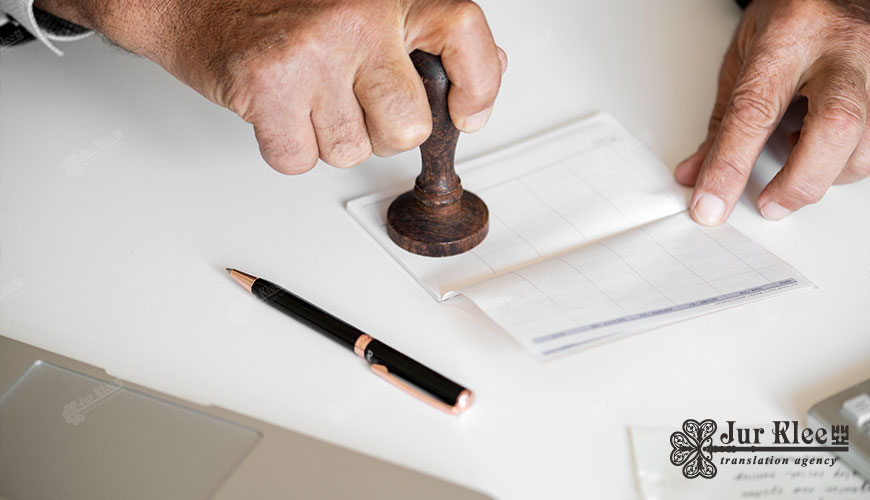
What is a notarized translation and where can we make it?
A notarized translation is a legally certified text that accurately translates the meaning from the original language. No text document will have legal force without a corresponding notarization. In the translation agency, a qualified translator, whose competence is certified by a notary, makes the exact translation of the text. In other words, a notarized translation is a confirmation by a notary of a specialist's ability to translate a specific text. If you need to notarize a translation from Chinese, but there is no such language discipline in the diploma of a specialist translator, the notary will simply refuse to confirm the competence of the specialist.
In Ukraine, the notary's signature and seal must be present when translating many important documents into Ukrainian. The most popular ones are:
- Translation of passports, birth certificates, and other identity documents.
- Translation of foreign commercial contracts.
- Decryption of seals and stamps. Seal ink loses its visual clarity over time.
- Translation of user's manuals. This is especially important when starting to sell imported medicines.
A usual seal of a translation agency is sufficient only for insignificant documentation or for texts that are not intended to be presented anywhere (instructions for equipment, auxiliary appendices to contracts).
Apostille. Documents to be submitted to foreign institutions or to foreign commercial structures
According to the Hague Convention of 1961, it is customary to use a single standardized form for filling out documents for the convenience of processing multilingual documentation. The text in an apostille can be written in any of the many languages of the countries participating in the Convention. Of course, foreign institutions are always more meticulous about the legal force of a document than domestic ones. Moreover, when drawing up documentation in an apostille, it is better to purchase a legally authorized translation in advance.
Where can we notarize a translation?
Not all clients understand what a notarized translation is. Of course, no one is required to know initially where to translate and notarize documents. However, the full range of translation and notarization services can be obtained in one place at once. The translation agency is a universal service agency where you can certify the translation of documents without the client's participation in further bureaucratic procedures. Professional offices always strive to ensure that the client receives the service on time and no more than in two visits (submission of documents and their receipt).
In Jur Klee Translation Agency, the client can make a notarized translation in just one visit, without having to return for the finished document. In order to optimize the service, we cooperate with the courier service "Nova Poshta". However, this small margin for delivery or shipment pays for the time and nerves saved by our customers in the traffic jams of the capital. Therefore, the solution of the problem, where in Kyiv you can certify the translation of documents, becomes obvious.

How to make a notarized translation?
To understand how to make a notarized translation, you do not need to delve into the bureaucratic technology of the processes. For a client of Jur Kee Translation Agency it is only important to provide the original text document that requires translation. In this case, the operators themselves will make a copy and offer the client options on how best to certify the translation of the document. After a short registration procedure, the original document is returned to the owner. Then the document (or text) is sent to the appropriate translator for translation.
When the exact meaning of the document is finally revealed, the specialist draws it up properly. For example, if a foreign passport is being translated, the text structure, rows and columns are fully reproduced. Upon completion of the work, the specialist makes a final check of the accuracy of the translation and the structure of the text. If necessary, the Agency puts its seal. After that, the specialist's translator is sent to the notary. Professionals already know in advance how to notarize the translation of a document without unnecessary delay.
The notary checks the competence of the translator (educational level, the presence of the translation language in the diploma, the legality of the diploma, the visual proportionality of the structure of the translated text). At the end of all verification procedures, they make their verdict.
Excessive loyalty of the notary office to the translation agency is excluded, because the status of a notary is not easy to get. For their services, notary offices receive stable but small amounts of money from the translation agencies. They make much more profit from other types of notarization. No notary will allow themselves to lose a profitable business or get a substantial fine because of pity for an understudied translator.
For a client, the most important thing is not how to certify the transfer, but how quickly and inexpensively they will get a desirable result.
What does a notarized translation look like?
A notarized translation is a document that must include the following:
- Text translated from the original language.
- Translator's signature.
- Notary's certificate with a seal.
Depending on the conditions, the notary's certificate can be of two types.
The first type is a simple certification of a translator's signature. It is used in cases when a translation of a text is submitted together with an original. Most often, a simple translation is ordered when submitting documents to Ukrainian state institutions.
The second type is the certification of a translator's signature with simultaneous certification of the authenticity of the copy from an original document. In this version, the notary, in addition to confirming the identity of a translator, compares the original of the translated document with its accepted copy. This complicated type of notarization is necessary if a translation is submitted with a mandatory confirmation of compliance of the original and its copy.
How much does it cost to notarize a translation?
The cost of notarized translation of documents consists of two components: the volume of the text and its complexity. Volume is measured in the number of translated pages. The complexity of the translated text depends on the following factors:
- Target language. Translation from European languages into Ukrainian is much cheaper than, for example, translation from Japanese.
- Document type. Translation of ten pages of a passport will cost less than translation of ten pages of the foreign instruction manual of equipment. Text processing with complex technical terminology can also affect the cost of notarized translation of documents.
- Document readability. Faded ink can make translation very difficult. Complex transcription increases the value of the translator's work and increases the cost of notarizing translations.
To understand how much it costs to translate and notarize the documents, you can use the services of an online consultant on our website.
